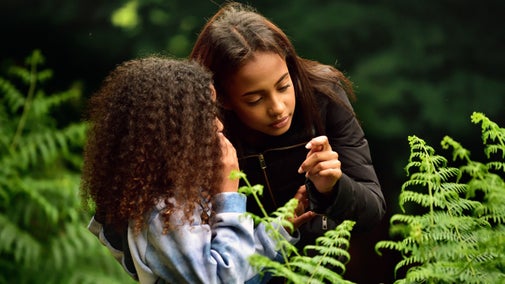
Donate
Everyone needs nature, now more than ever. Donate today and you could help people and nature to thrive at the places we care for.

Learn about some of the work that National Trust staff and volunteers carry out throughout the year to keep Embleton and Newton Links safe for visitors and wildlife alike.
The Long Nanny shorebird site is located between the villages of Beadnell and Low Newton. It is a nationally important breeding site for several species and 2025 marks 48 years since the National Trust began working to protect the site and the birds that breed there.
Each year we rope off a section of the coast between Beadnell and High Newton to protect the nesting grounds of several important breeding birds, including the Arctic tern, little tern and ringed plover. Rangers live and work along this stretch of coastline during the nesting season to monitor the birds and show them to visitors.
When the birds are left undisturbed on the beach, it maximises the chances of a successful breeding year with as many fledglings as possible. This helps towards ensuring the survival of the threatened species that call this estuary home.
We make sure that visitors can still enjoy their walk along this beautiful stretch of coastline, while watching these beautiful birds from a safe distance.
We are thrilled to have completed our tree planting project at St Cuthbert's Cave, repairing the damage caused by Storm Arwen.
We have partnered with the Great Northumberland Forest Project at Northumberland County Council and the Woodland Trust to secure funding and appropriate trees suitable for the location. We plan to re-plant with mixed native species- both coniferous and deciduous to promote a more biodiverse environment for wildlife and our visitors for years to come.
The woodland will be less of a " block" plantation than it was previously, as we are planting shrubby trees to create a canopy that is of differing heights. This will help to create a woodland that is more resilient to future storms. Species include fruiting trees such as Rowan, Holly, Crab Apple and Hawthorn and other trees such as Scots Pine, Wych Elm, Willow, Cherry, Dog Rose and Birch.
We have made a conscious decision not to plant Ash, Oak or Beech in order to minimise habitat for grey squirrels as the site is next door to Kyloe woods, which is an important Red Squirrel Protection Zone. As part of the project we're trialling the use of soil biodegradable tree shelters (made from wood pulp rather than traditional plastic) to protect our newly planted trees from nibbling herbivores, in an environmentally - friendly way.
But perhaps the most exciting bit - we have been offered some cuttings of Black Poplar from Durham University and we are overjoyed to be planting these here to help preserve such a rare and important native species.
Thank you to our brilliant volunteers for helping us to get these trees into the ground.
With your ongoing support, we're able to continue our vital conservation work. Thank you for helping to protect these special places.

Everyone needs nature, now more than ever. Donate today and you could help people and nature to thrive at the places we care for.

From leading rambles through rock pools to litter picking with school groups, learn what’s involved in being a volunteer at Embleton and Newton Links, how to apply and more.

Head to Embleton and Newton Links to discover the 18th-century fishing hamlet of Low Newton, scramble across a natural rock harbour and sandy beach, and spot wildlife at Newton Pool Nature Reserve.

Read about our strategy, which focuses on restoring nature, ending unequal access and inspiring more people.

We believe that nature, beauty and history are for everyone. That’s why we’re supporting wildlife, protecting historic sites and more. Find out about our work.